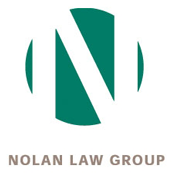Brain Injury Litigation Experience
Open vs. Closed Head Injury
A head injury is either open or closed. An open-head injury occurs when the skull is fractured and a foreign object breaks through the skull and punctures the brain. This serious type of head injury exposes the brain to unsanitary conditions, such as bacteria and infections. A closed-head injury does not fracture the skull. Brain damage resulting from a closed-head injury brain damage can be caused by rapid acceleration/deceleration of the head (whiplash) or other violent forces which do not fracture the skull.
Nolan Law Group is currently evaluating cases in which patients have experienced one or more of the following symptoms after being involved in an accident:
- Headache
- Dizziness
- Confusion
- Irritability
- Numbness
- Nausea
- Vomiting
- Dilated pupils
- Pupil – different sizes
- Mental confusion
- Memory problems
- Unusual behavior
- Difficulty with vision
- Difficulty waking up
- Grogginess
- Convulsions
If you, or someone you love, have been injured or are suffering from an Open or Closed Head Injury and would like the attorneys at Nolan Law Group to review your case, please contact us.
Moderate And Severe Brain Injury
Moderate and severe brain injuries usually involve brain damage that is easily detectable on CT scans, MRI’s, and other imaging devices. Brain swelling, contusion and edema are likely complications and, in many instances, the patient’s very life may be at risk. The injury may have a catastrophic impact not only on the life of the injured person, but also on the lives of his or her family members and loved ones. Those individuals who have sustained a skull fracture, concussion, hemorrhage, significant loss of consciousness or are in a coma are typically diagnosed as having sustained a “moderate” to “severe” traumatic brain injury. Individuals who are in a coma represent the severe end of the traumatic brain injury spectrum.
This is not to say that one needs be comatose in order to be classified as having sustained a severe traumatic brain injury, but comatose individuals have clearly sustained a severe traumatic brain injury.
Nolan Law Group is currently evaluating cases in which patients have experienced one or more of the following symptoms after being involved in an accident:
- Loss of consciousness
- Personality change
- Severe, persistent, or worsening headache
- Repeated vomiting or nausea
- Seizures
- Inability to awaken
- Dilation (widening) of one or both pupils
- Slurred speech
- Weakness or numbness in the extremities
- Loss of coordination
- Increased confusion, restlessness, or agitation
- Abnormal posturing, such as decorticate or decerebrate posturing
- Vomiting and neurological deficit
If you, or someone you love, have been injured or are suffering from a Severe Brain Injury and would like the attorneys at Nolan Law Group to review your case, please contact us.
Mild Traumatic Brain Injury
Mild traumatic brain injury is also called subtle acquired brain injury. People with mild or subtle brain injuries have cognitive, psychological and physical symptoms that occur after the injury. They usually do not experience a prolonged period of unconsciousness or coma. In fact, some individuals report no loss of consciousness.
Nolan Law Group is currently evaluating cases in which patients have experienced one or more of the following symptoms after being involved in an accident:
- Any period of loss of consciousness
- Any loss of memory for events immediately before or after the accident
- Any alteration in mental state at the time of the accident (i.e. feeling dazed, disoriented or confused)
- Focal neurological deficit(s)
- Loss of consciousness for approximately 30 minutes or less
- Initial Glasgow Coma Scale (GCS) of 13-15
- Post-traumatic amnesia (PTA) not more than 24 hours
If you, or someone you love, have been injured or are suffering from a mild brain injury and would like the attorneys at Nolan Law Group to review your case, please contact us.
Concussion
A concussion is the most common type of traumatic brain injury. Concussions can result from the brain being battered or violently shaken. Typically, concussions are followed by an alteration in consciousness and victims may appear dazed or disoriented. The term concussion is often used interchangeably with the words head injury and mild brain injury. It is important to note that a blow to the head is not required for brain damage to occur.
Nolan Law Group is currently evaluating cases in which patients have experienced one or more of the following symptoms after being involved in an accident:
- Headache
- Dizziness
- Confusion
- Irritability
- Numbness
- Nausea
- Vomiting
- Dilated pupils
- Pupils – different sizes
- Mental confusion
- Memory problems
- Unusual behavior
- Difficulty with vision
- Difficulty waking up
- Grogginess
- Convulsions
If you, or someone you love, have been injured or are suffering from a concussion and would like the attorneys at Nolan Law Group to review your case, please contact us.
Post-Concussion Syndrome
PCS is a specific set of neuropsychological disorders (thinking, behavioral, and emotional) caused by traumatic brain injury. PCS results from actual physical damage or injury to the brain caused by an external force. A brain subjected to such violent forces can be torn, sheared, crushed, displaced, or simply destroyed. The brain can bleed, swell and, occasionally, might even shut down.
Nolan Law Group is currently evaluating cases in which patients have experienced one or more of the following symptoms after being involved in an accident:
- Headaches
- Dizziness
- Fatigue
- Irritability
- Anxiety
- Insomnia
- Loss of concentration and memory
- Noise and light sensitivity
If you, or someone you love, have been injured or are suffering from Post Concussion Syndrome and would like the attorneys at Nolan Law Group to review your case, please contact us.
Post-Traumatic Stress Disorder (PTSD)
According to the National Institute of Mental Health, post-traumatic stress disorder (PTSD) is an anxiety disorder that can develop after exposure to a terrifying event or life-threatening ordeal. Such events may include serious accidents, military combat, natural disasters and violent personal assaults. Although classified as a psychological disorder, research has shown that PTSD, when persistent, can manifest physical or biological alterations in the brain. PTSD has been associated with over-production of the stress hormones known as glucocorticoids and over-production of the excitatory neurochemicals known as glutamate and aspartate. These neurotransmitters cause excess intracellular calcium release and result in intracellular injury. PTSD has also been known to cause atrophy of the hippocampus. Impairments in hippocampal circuitry induce a number of sensory, emotional and memory symptoms which appear to alter the excitatory and inhibitory circuitry of the brain. Architectural changes of this nature can ultimately become permanent, organic brain changes.
Nolan Law Group is currently evaluating cases in which patients have experienced one or more of the following symptoms after being involved in an accident:
- Difficulty falling or staying asleep
- Irritability or outbursts of anger
- Difficulty concentrating
- Hyper-vigilance
- Exaggerated startle response
If you, or someone you love, have been injured or are suffering from PTSD and would like the attorneys at Nolan Law Group to review your case, please contact us.

